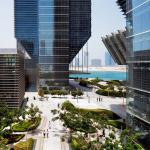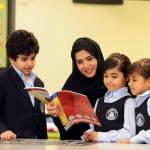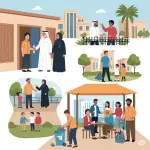Abu Dhabi: Schools across the United Arab Emirates ushered in the 2025–2026 academic year today, welcoming more than one million students into classrooms nationwide. The opening day brought an atmosphere abundant with enthusiasm, innovative ambition, and renewed promise for the future.
From bustling entrances in Abu Dhabi to the vibrant campuses of Fujairah, young learners poured back into school grounds, greeting familiar faces and stepping into new beginnings. The return signaled more than just the end of summer—this year heralds a transformative phase in the UAE’s educational journey.
A Presidential Welcome with Forward-Looking Vision
President His Highness Sheikh Mohamed bin Zayed Al Nahyan addressed the education community—students, teachers, administrators, and families—with a message delivered via social media. Extending his heartfelt congratulations on the new academic year, he emphasized:
“Education remains the foundation of our nation’s continued advancement… we are committed to investing in our students as we work collectively towards shaping a better future for all.”
He encouraged a collaborative partnership between families and schools, urging all to support students in pursuing excellence with enduring drive. His message reaffirmed the central role of education in fulfilling the UAE’s long-term national vision.
A Strategic Back-to-School Rollout
The Ministry of Education orchestrated the year’s kickoff with careful planning. More than one million students were welcomed across public and private schools—including kindergartens—with the return process set to continue smoothly throughout the week.
Under the theme “From Skills to Leadership,” the Ministry prioritized both academic and psychological readiness, ensuring students ease into learning with structured support. Class schedules were staggered to prevent overcrowding, and school operations were fine-tuned to foster a nurturing and orderly start.
Major Reforms Set the Tone for a Future-Ready Education
This academic year introduces five key reforms, reflecting a strategic shift toward modernized learning frameworks:
Centralized Exams Abolished in Semester 2
Final assessments during the second semester will now be determined by individual schools and teachers—replacing uniform, high-stakes exams.
Revised Grade Weightings
Assessment distribution has been restructured: Semester 1 contributes 40% (30% exams, 10% teacher-based), Semester 2 relies solely on teacher evaluations (20%), and Semester 3 mirrors Semester 1's split.
Introduction of AI Curriculum
For the first time, students from kindergarten through Grade 12 will experience an Artificial Intelligence curriculum. This hands-on program emphasizes real-world AI concepts, ethical awareness, innovation, and community engagement. The content is tailored to different age groups, delivered by around 1,000 trained teachers.
Consolidation of Academic Tracks
The academic pathways have been streamlined into two main tracks: “General” and “Advanced”, designed to better align educational progression with students’ abilities and reduce unnecessary load.
Nationwide Teacher Competency Evaluation
Some 23,000 educators and administrators—across all teaching cycles—will undergo an evaluation program aimed at identifying strengths, developing clear career paths, and elevating educational quality.
Complementing these changes, the academic year spans 178 instructional days, divided into three semesters, and includes thoughtfully placed breaks (including a holiday for the Prophet’s Birthday on September 4) to balance academic demands and rest.
Infrastructure and Resources Supporting the Restart
The Ministry’s readiness went beyond policymaking. Schools upgraded facilities and completed renovations in more than 460 schools. Nine new schools have opened, accommodating approximately 25,000 additional students—responding to growing demand. Logistics were equally robust: over 5,500 school buses were deployed, 10 million textbooks printed, and roughly 47,000 laptops distributed.
A Day of Warm Welcoming Energy
Scenes across the country painted a picture of care and optimism. At the Zayed Education Complex in Al Suyouh, dedicated staff orchestrated morning assemblies with flag-raising ceremonies and energizing physical activity. Students, both familiar and new, were guided into classes with gentle orientation and introductions—fostering a sense of belonging from day one.
Parents shared mixed emotions: in Abu Dhabi, a Grade 5 pupil admitted feeling “a little nervous about the harder subject knowledge this year” but was optimistic about new projects and friendships. Another parent expressed hope for their child’s holistic growth, praising the clear communication lines schools offer.
Traffic challenges, typical of the opening day rush, were managed with coordination between crossing guards and police patrols stationed near school zones—prioritizing safety as students entered the academic year.
Voices from Leaders: Inspiration from Within
Adding to the national spirit, Sheikh Hamdan bin Mohammed, Crown Prince of Dubai, shared a touching social media message alongside childhood photos. Reflecting on his own early school experiences, he said:
“For knowledge is light and with it, nations rise. With every new school year a fresh dream is born. Together, we shape the future of our homeland and always remember, with knowledge we rise and with values, we build.”
His words resonated widely, reminding students that education builds more than intellect—it molds character, identity, and ambition.
Looking Ahead: Foundations of a Progressive Academic Year
The 2025–2026 academic year sets a dynamic tone, rooted in strategic educational reform, technological integration, and values-based learning. Through innovations like AI education, updated evaluation methods, and strengthened teacher support frameworks, the UAE continues to position its students and educators at the forefront of global educational advancement.
As classrooms came alive today—from the youngest kindergartners to seasoned educators—the message was clear: this year isn’t just the start of another school year—it’s the beginning of a new chapter in the UAE’s educational journey, grounded in excellence, unity, and forward momentum.










